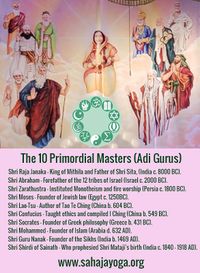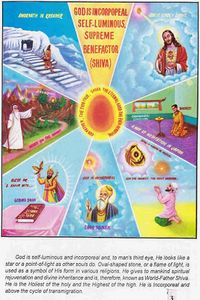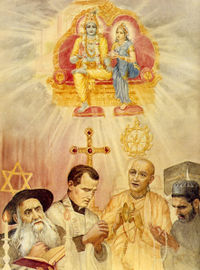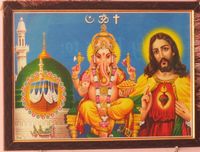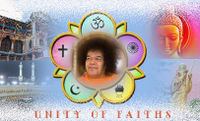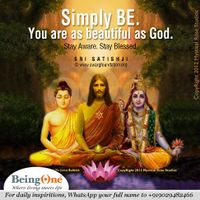“Hinduism’s basic tenet is that many roads exist by which men have pursued and still pursue their quest for the truth and that none has universal validity.” – Kenneth Scott Latourette
Samyag darshan ("Right worldview", "Proper viewpoint", "Correct insight", or "Rationality of perception") as opposed to mithya darshan ("improper viewpoint")[1] is required for attaining Moksha. It is recommended for Hindus to think objectively when it comes to the their outlook circumstances. Samyag darshan is the objective worldview. Objectivity is bias-free whereas subjectively is biased. Hence Objectivity, allows for an all-inclusive resolution. This is important because of the principle of vasudhaiva kutumbakam[2], which means "the whole world is one family." As such, in order for a family to function, it requires everyone play a part in its success for the present and future generations. Sathya Sai Baba proclaimed, "All is divine, all is God, and unity is divinity." Following this line of thought, aikatmyam is the principle of identifying with the entire universe, and it helps the self in thinking [and hence, living out] the vasudhaiva kutumbakam ideal.
| As is the individual, so is the universe As is the universe, so is the individual |
||
—Yajur Veda | ||
Samadarshan[edit]
| May noble and auspicious thoughts come to us from all over the Universe | ||
—Rig Veda 1.89.1 | ||
| The truth is one - the sages express it variously | ||
—Rig Veda 1.164.46 | ||
| That which is one has multiplied unto all | ||
—Rig Veda 8.59.2 | ||
Samadarshan means "Equal viewpoint" or "Equal worldview." This idea is important in life so individuals can avoid bias and come to a mutually beneficial solution. It compares to the Jain Anekantavada ("non-one-sidedness.") The term appears in the Bhagavad Gita wherein Krishna advises humans to see all with a equal vision.[3]
"This sarvatra samadarsana is the supreme ideal of Hinduism. This is the state of liberation or Moksha." - The Astrological Magazine[4]
Someone who thinks with this principle is a Samadarshi. The right worldview is required in order to obtain Moksha.[5][6]
The verse below is what ties the Samadarshan principle in with Loksangraha:
| Where the mind is without fear, and the head is held high; Where Knowledge is free; Where the world has not been broken up into fragments by narrow domestic walls;...Where the clear stream of reason has not lost its way into the dreary desert sand of dead habit;...Into that heaven of freedom, my Father, let my country awake. | ||
—Geetanjali | ||
Further, the Jnana Sankalini Tantra gives 6 virtues for humans, and 1 of them includes uparati (indifferent outlook for worldly endeavours), which is along the lines of samadarshan.[7]
Loksangraha[edit]
| Dharma exists for the welfare of all beings. Hence, that by which the welfare of all living beings is sustained, that for sure is dharma. | ||
—Mahabharata 109.10 | ||
If Vasudhaiva Kutumbakam is true and must become a reality, then working towards it is a must. Loksangraha means “well-being of the world.”
| On who sees all creatures as if they were his own selves and himself in others - his mind rests in peace | ||
—Yajur Veda 40-46 | ||
Sarvabhutahita also means "working for the welfare of all humanity" and samya means "becoming one". 'Inclusivism' is a term invented by Paul Hacker in 1957 in his article titled "Tolerance and Intolerance in Hinduism," in which he portrays Hinduism as doctrinally tolerant and does not superimpose.[8] Sadharana Dharma is the term for a universal set of principles that would apply to all people equally. Antahkarana-shuddhi is the purity by being compassionate to all.[9]
“I am proud to belong to a religion which has taught the world both tolerance and universal acceptance. We believe not only in universal tolerance, but we accept all religions as true." - Swami Vivekanand[10]
As a result, Hindus tend to be very tolerant and Hindu societies have allowed other religions to develop in terms to building their institutions (i.e., worship halls, post-secondary institutes, political parties.) Sarva Dharma means, "All Religions and this concept has been preached by Hindus for social harmony. For example, Sarwa Dharma Mahavidyalaya and Sarwa Dharma Vidhi Mahavidhyalaya are post-secondaries while Sarva Dharma Sthal Temple is a worship hall for all religions, and Sarva Dharma Sammelan is a yearly summit of all religions in India. Swami Vivekānanda called the idea that "all religions are equal," Sarva Dharma Samabhava. Swami Shantatmanand called it Dharma Samanvaya, and the Ramakrishna Mission organization calls it Dharma Siwan Waya.
| Shunning all differences, we should speak together, our minds should work together, and our thoughts should be in harmony. | ||
—Yajur Veda[11] | ||
Trikarana shuddhi[edit]
| Purity of speech, of body, and of mind, forgiveness, truth, firmness and intelligence, these good qualities are shown by pious persons who observe both kinds of dharm. | ||
—Mahabharata 12.214.6[1] | ||
This process of 'purification' helps cleanse the mind, speech, and deeds. Sarvabhutatma-bhutatma also means antahkarana-shuddhi ("purity by being compassionate to all.") The Mahabharata elaborates this concept by stating, "Manasyekam vachasyekam karmanyekam mahatmanam" or "All are one; there is no disparity in ideas, expression and deeds, and he is a Mahatma who applies this concept." Another term for trikarana shuddhi is sattva-samshuddhi, which appears in the Bhagavad Gita. The monastic order of the Vaishnav Tri-Dandin (Triple-Staffed) had its emblem of 3 staffs represent 'restraint in speech[12], restraint in bodily senses [13], and restraint in mind[14].
Mahatma Gandhi would say, "See no evil. Hear no evil. Speak no evil." This statement ties into the principle of trikarana shuddhi.
The Yajur Veda says:
- "We are prostrating you (Rudra) with trikarana shuddhi."
The three words also appear at Mahabharata[15]:
- "In consequence of what I have done to the Brahmanas in thought, word, and deed, I do not feel any pain now [even though I am lying on a bed of arrows]."[16]
They appear in at least one version of the Guru Gita[17]:
- "With actions, speech, and thought, constantly strive to satisfy the guru. With sincerity, prostate before the guru and offer hull honor."
The Padma Purana says on Prahlada:
- "He, of a delighted mind, never knew anyone else except the lord of gods in all conditions and deeds (done) with his mind, speech and body. The humble and very intelligent one stayed in his preceptor's house at a (proper) time."
In contrast, one who seeks to cause harm to others in mind, speech, and deed is a purvalodra.[18]
Quotes regarding self-restrain from Sanatan and other Arya teachers:
| Krishna | Narada | Patanjali | Gautam Buddha | Mahavir | Guru Nanak | Mahatma Gandhi |
|---|---|---|---|---|---|---|
|
|
|
|
|
|
|
Related articles[edit]
References[edit]
- ↑ P. 715 Encyclopedia of Hinduism By Catherine Robinson, Denise Cush, Michael York
- ↑ Maha-Upanishad
- ↑ ”The truly learned, with the eyes of divine knowledge, see with equal vision a Brahmin, a cow, an elephant, a dog, and a dog-eater.” (B.G. 5.18)
- ↑ P. 291 The Astrological Magazine, Volume 91 By Raman Publications
- ↑ "Samyag-darshana-kalam eva tat phalam sarvatmatvam darsayati" - Adi Shankara's Brahma Sutra Bhasya 3.3.32
"Precisely at the time that right knowledge arises, its result - being the Self of all - is realized." - ↑ "Jnana-samana-kalaiva mukti" - Anandagirivyakhya
"Liberation is exactly simultaneous with the rise of knowledge." - ↑ P. 91 Jnana Sankalini Tantra By Paramhamsa Prajnanananda
- ↑ Swami Vivekananda and Non-Hindu Traditions: A Universal Advaita By Stephen E. Gregg
- ↑ P. 220 Tat Tvam Asi: The Universal Massage in the Bhagavadgītā · Volume 1 By Pathikonda Viswambara Nath
- ↑ P. 360 Religious Tolerance in World Religions By Jacob Neusner and Bruce Chilton
- ↑ Samgachhadhvam samvadadhvam sam vo manansi janatam
- ↑ Vāg-danda
- ↑ Kāya-danda
- ↑ Mano-danda
- ↑ Mahabharata 13.8.16
- ↑ Sanskrit text and English translation
- ↑ Guru Gita 1.51
- ↑ Culture and International Law: Proceedings of the International Conference of the Centre for International Law Studies (CILS 2018), October 2-3, 2018, Malang, Indonesia By Hikmahanto Juwana, Jeffrey Thomas, Mohd Hazmi Mohd Rusli
- ↑ Bhagavad-Gītā 6.5-7
- ↑ Bhagavad Purana 7.8.11[107]
- ↑ Uttaradhyayana Sutra 9.34-36
- ↑ Japu 26, Guru Granth 6

